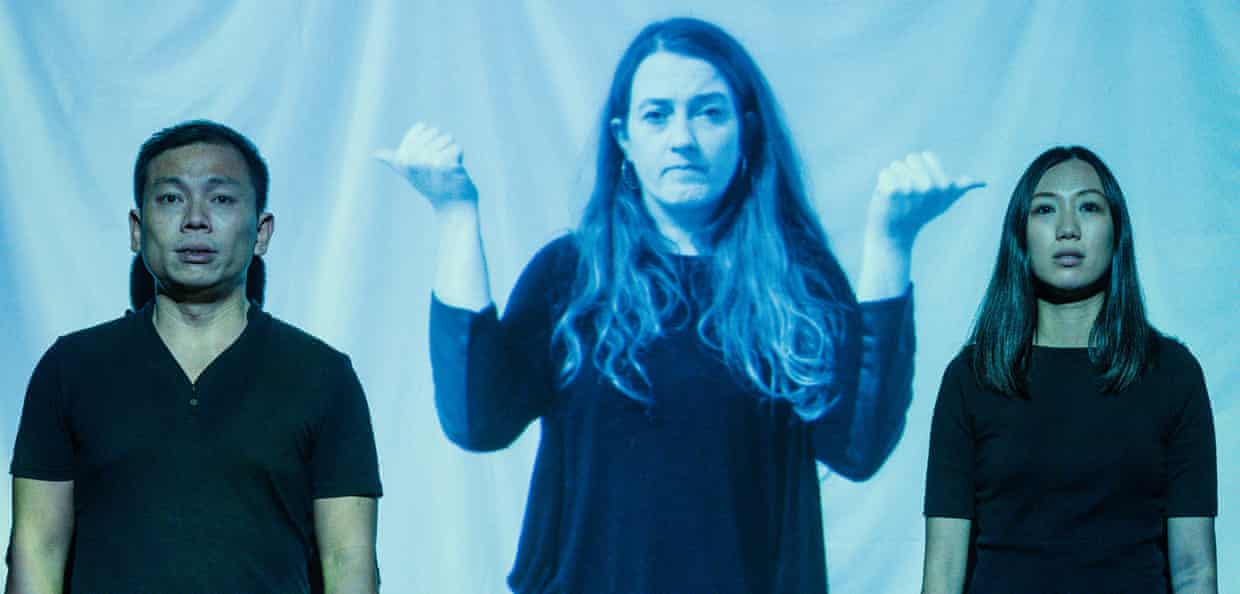When I saw And Suddenly I Disappear, it felt that, suddenly, there was actually a chance that I might personally appear. Not definitely. I still don’t know where. But at least now there’s a chance. For maybe a chance appearance.
Thankyou thankyou THANKYOU for that to Kaite O Reilly and the whole splendid ensemble!
Kaite explores “the politics of identity beyond the abstractions of liberal hand-wringing. Her radical insight is that what truly disables a person is not necessarily any physical impairment or mental health challenge they might have, but the wilful ignorance, fearful hostility and patronising attitudes of a societal mainstream that would rather erase, forget or smooth-over difference, than accept it as an essential marker of the human condition.”
And Suddenly I Disappear is a series of (deaf / disabled) ‘d’ monologues. There is on-stage action in English, Welsh, and multiple Singaporean verbal and sign languages; plus videos of all the above; on-stage / video combos; and cheeky and serious audio description.
I can’t stop thinking about – and trying to learn from – all the layers!
Disability Arts Online underlines that: “Every single member of the cast shines like a constellation of disparate stars, sometimes in unison but not always in harmony. As a collection of monologues, the interaction between characters is minimal. A recurring theme is the invisibility of disabled and Deaf people across cultures and on multiple levels. The lack of interaction on stage amplifies the sense that these characters are invisible.”
Here’s a 1 minute taster:
A monologue about a woman in Singapore, physically bent and squashed by a lifetime of harsh physical labour, especially disrupts and challenges the “hegemony and predominance of both the English language and the spoken word “. After all, disability isn’t always “a question of biological accident, it is a product of political and racist oppression”. Various aspects of difference: disability, gender, sexuality, culture and ethnicity, are “interrelated rather than separate and distinct”. The relentless “push for economic growth produces a materialist, consumer-driven society that grows fixated on homogeneity and conformity rather than plurality and diversity.”
Grace Khoo has shared the inside story of the production’s journey: “My mind never strays far from the ethics of accessibility and the aesthetics of access … [we have been] co-creating new theatre vocabularies about access”. With an urgent call “to smash stereotypes and go beyond mainstream representations of disability… Talking the talk naturally led to walking the walk. There wasn’t an accessible ticketing platform in Singapore, so we simply built one on our website. The company could not travel to the city of Mindanao to perform at the La Salle University for its Deaf and disabled beneficiaries, staff and students, so we … pulled off a quality live-streaming event which reached hundreds of audiences in the Philippines, Taiwan and Hong Kong.”
Khoo is clear that: “while some are working hard and knocking on doors about inclusion, pushing Deaf and disabled people to rise up and be subsumed into the mainstream, we work differently. Deaf and disabled people have always been around. Inclusion, when you follow the social model, is a given.” And Suddenly I Disappear “refuses to conform to the mainstream gaze and unconscious bias about what theatre should be.”
And Suddenly I Disappear demands that “difference be celebrated and valued and not merely tolerated”.
The stripped-down stage aesthetic “self-consciously lays bare the mechanics of theatrical representation, and reminds the audience throughout of the fictiveness of storytelling. This is no mere post-modernist game; understanding the processes of manufacturing and controlling narratives is crucial to interpreting these monologues. They each hinge on a question of power – the ability to tell your story is, after all, having the power to determine how you are perceived by others. At the very least, it is the power to frame the discussion about your public self.”
You need to see more for yourself! And while of course an actual live show is surely best, here’s the Singapore version:
